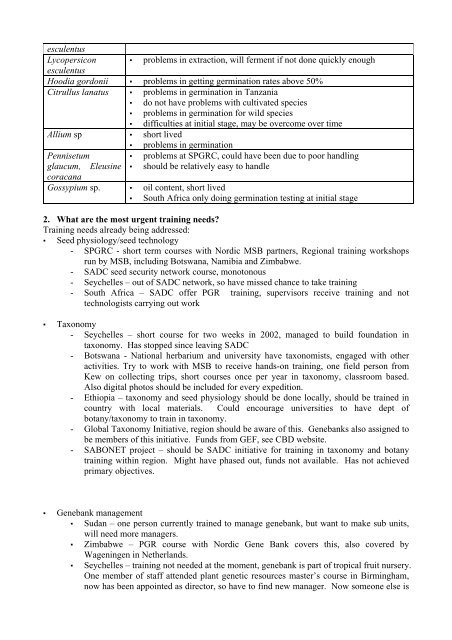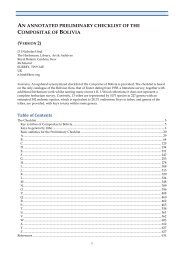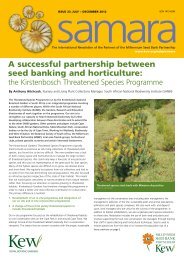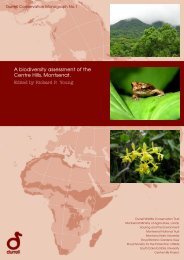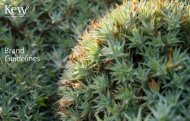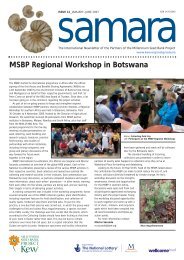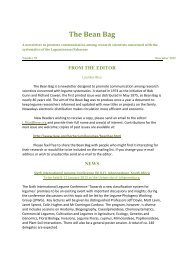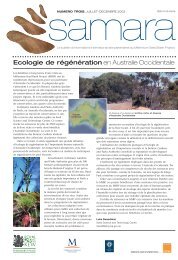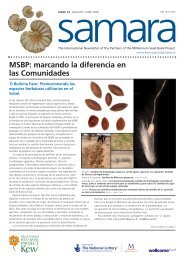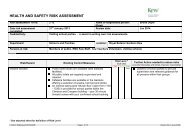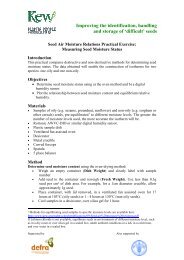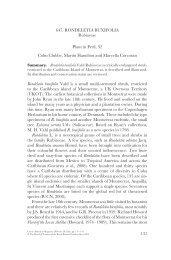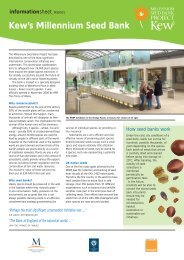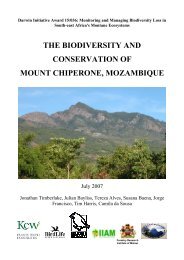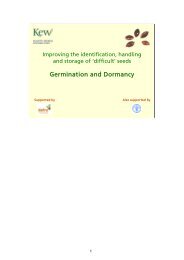Improving the identification, handling and storage of âdifficultâ seeds ...
Improving the identification, handling and storage of âdifficultâ seeds ...
Improving the identification, handling and storage of âdifficultâ seeds ...
Create successful ePaper yourself
Turn your PDF publications into a flip-book with our unique Google optimized e-Paper software.
esculentus<br />
Lycopersicon ▪ problems in extraction, will ferment if not done quickly enough<br />
esculentus<br />
Hoodia gordonii ▪ problems in getting germination rates above 50%<br />
Citrullus lanatus ▪ problems in germination in Tanzania<br />
▪ do not have problems with cultivated species<br />
▪ problems in germination for wild species<br />
▪ difficulties at initial stage, may be overcome over time<br />
Allium sp ▪ short lived<br />
▪ problems in germination<br />
Pennisetum<br />
▪ problems at SPGRC, could have been due to poor <strong>h<strong>and</strong>ling</strong><br />
glaucum, Eleusine ▪ should be relatively easy to h<strong>and</strong>le<br />
coracana<br />
Gossypium sp. ▪ oil content, short lived<br />
▪ South Africa only doing germination testing at initial stage<br />
2. What are <strong>the</strong> most urgent training needs?<br />
Training needs already being addressed:<br />
▪ Seed physiology/seed technology<br />
- SPGRC - short term courses with Nordic MSB partners, Regional training workshops<br />
run by MSB, including Botswana, Namibia <strong>and</strong> Zimbabwe.<br />
- SADC seed security network course, monotonous<br />
- Seychelles – out <strong>of</strong> SADC network, so have missed chance to take training<br />
- South Africa – SADC <strong>of</strong>fer PGR training, supervisors receive training <strong>and</strong> not<br />
technologists carrying out work<br />
▪<br />
Taxonomy<br />
- Seychelles – short course for two weeks in 2002, managed to build foundation in<br />
taxonomy. Has stopped since leaving SADC<br />
- Botswana - National herbarium <strong>and</strong> university have taxonomists, engaged with o<strong>the</strong>r<br />
activities. Try to work with MSB to receive h<strong>and</strong>s-on training, one field person from<br />
Kew on collecting trips, short courses once per year in taxonomy, classroom based.<br />
Also digital photos should be included for every expedition.<br />
- Ethiopia – taxonomy <strong>and</strong> seed physiology should be done locally, should be trained in<br />
country with local materials. Could encourage universities to have dept <strong>of</strong><br />
botany/taxonomy to train in taxonomy.<br />
- Global Taxonomy Initiative, region should be aware <strong>of</strong> this. Genebanks also assigned to<br />
be members <strong>of</strong> this initiative. Funds from GEF, see CBD website.<br />
- SABONET project – should be SADC initiative for training in taxonomy <strong>and</strong> botany<br />
training within region. Might have phased out, funds not available. Has not achieved<br />
primary objectives.<br />
▪<br />
Genebank management<br />
▪ Sudan – one person currently trained to manage genebank, but want to make sub units,<br />
will need more managers.<br />
▪ Zimbabwe – PGR course with Nordic Gene Bank covers this, also covered by<br />
Wageningen in Ne<strong>the</strong>rl<strong>and</strong>s.<br />
▪ Seychelles – training not needed at <strong>the</strong> moment, genebank is part <strong>of</strong> tropical fruit nursery.<br />
One member <strong>of</strong> staff attended plant genetic resources master’s course in Birmingham,<br />
now has been appointed as director, so have to find new manager. Now someone else is


